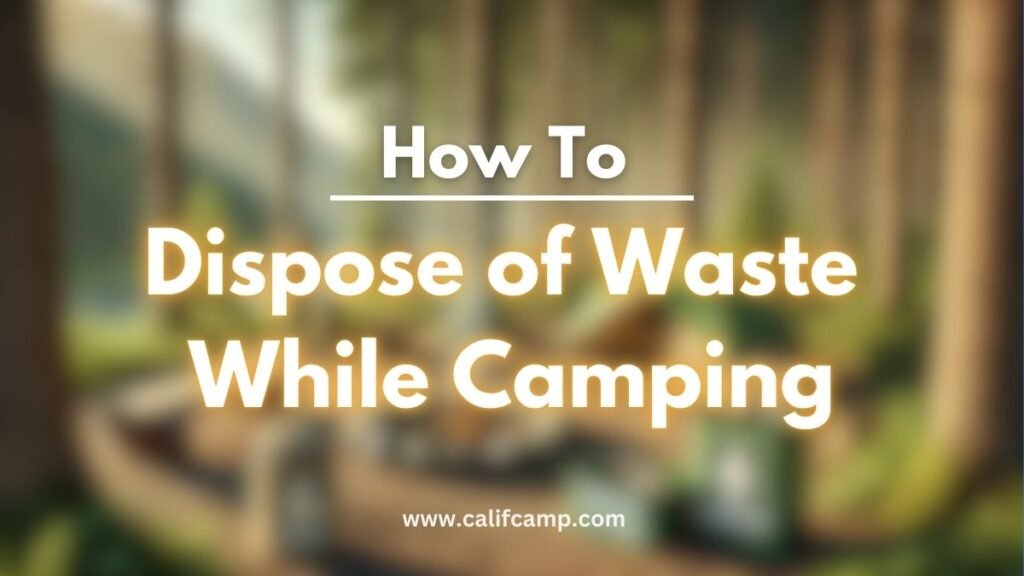Camping offers a unique chance to reconnect with nature, but it also requires us to act responsibly, especially when it comes to waste management. Understanding how to properly dispose of waste while camping not only helps maintain the beauty of outdoor spaces but also protects wildlife and the environment. In this guide, we’ll provide all the essential tips and methods for eco-friendly waste disposal, covering everything from general trash to food waste and human waste.
Table of Contents
Why Proper Waste Disposal Matters
Disposing of waste improperly can harm the ecosystem in numerous ways. Trash left behind attracts wildlife, pollutes water sources, and disrupts local habitats. By practicing Leave No Trace principles, which emphasize responsible outdoor ethics, we can enjoy nature sustainably and leave it unspoiled for future generations.
General Tips to Dispose of Waste While Camping
- Plan Ahead: Before heading out, research your camping area’s rules and guidelines for waste disposal. Many campsites have specific facilities, while some may require campers to pack out all waste. Having the right supplies, like biodegradable bags and trash containers, is also essential.
- Separate Your Waste: Separate recyclable items (like plastic and metal) from regular trash. Designate bags for different types of waste, which will make it easier to dispose of responsibly when you return home or reach a designated disposal site.
- Pack it In, Pack it Out: This is a fundamental rule of eco-friendly camping. Everything you bring to the campsite—whether it’s food, packaging, or gear—should be packed out when you leave. Minimize waste by choosing reusable or recyclable items whenever possible.
How to Handle Food Waste
Improper disposal of food waste can lead to serious environmental issues. Food scraps left behind attract animals, which can become dependent on human food and lose their natural foraging instincts. Here’s how to handle food waste effectively:
- Minimize Food Waste: Plan meals carefully to avoid excess food. Preparing meals ahead of time and packing only what you need reduces the amount of waste you’ll need to dispose of later.
- Store Food Properly: Use airtight containers to store leftovers and avoid attracting wildlife. For campsites without trash facilities, carry food scraps in sealed bags and dispose of them off-site.
- Composting: In certain areas, composting may be allowed. Check local regulations first, and use a compost bin to break down organic waste responsibly.
- Avoid Feeding Wildlife: Feeding animals, even unintentionally, can be harmful. Stick to proper waste disposal practices to prevent animals from becoming dependent on human-provided food.

How to Dispose of Human Waste
Managing human waste while camping is essential for both sanitation and environmental health. Here are some methods to consider:
- Catholes: For remote camping, dig a small hole (6-8 inches deep and at least 200 feet from water sources) to bury human waste. Use biodegradable toilet paper if possible and cover the hole with soil when done.
- Portable Toilets: Some campers prefer portable toilets, which can be emptied at designated disposal sites. This option is particularly useful for areas with strict rules about human waste disposal.
- Pack-Out Bags: In highly sensitive areas, packing out human waste with specially designed bags is often required. These bags are usually biodegradable and can be disposed of at specific waste stations.
Gray Water Disposal: Dishwater and Hygiene Waste
- Strain Dishwater: Strain food particles from dishwater before disposal. This minimizes food waste left in the environment, helping to avoid attracting wildlife.
- Dispose of Water Away from Campsites and Water Sources: Dispose of dishwater at least 200 feet from water sources. This prevents water contamination and protects natural habitats.
- Biodegradable Soap: Always use biodegradable soap for dishwashing and hygiene to reduce environmental impact. Never dump soapy water directly into lakes or streams.
Leave No Trace Principles for Waste Disposal
Adhering to Leave No Trace principles ensures that you dispose of waste while camping responsibly:
- Plan Ahead and Prepare: Knowing the rules of your camping location and having a waste management plan is key.
- Dispose of Waste Properly: Always pack out what you bring, and use designated disposal facilities when available.
- Respect Wildlife: Proper waste disposal prevents disturbing local wildlife.
- Be Considerate of Others: Leave campsites clean for the enjoyment of others.
Conclusion
Practicing responsible waste disposal is essential for preserving the beauty and health of camping areas. By following these tips and embracing eco-friendly habits, you contribute to the conservation of natural spaces, ensuring that they remain pristine for generations to come.
Read More
MacKerricher State Park Camping, Hiking Review 2024
FAQs
Q: Can I burn my trash in the campfire?
No. Burning trash, especially plastics and metals, releases harmful chemicals into the air and can create toxic residue. Always pack out trash and dispose of it properly.
Q: How should I handle pet waste?
Pet waste should be treated like human waste. Bury it in a cathole or pack it out using biodegradable bags.
Q: What do I do if there are no waste disposal facilities nearby?
Practice the “Pack it In, Pack it Out” principle. Bring enough bags to pack out all waste until you can dispose of it in a proper facility.




Good Advice Thanks.
Thank You.